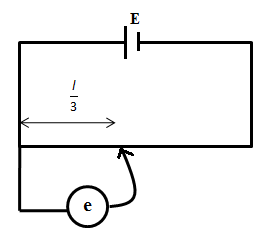Question
Question: The length of a potentiometer wire is l. A cell of emf E is balanced at a length \[\dfrac{l}{5}\] fr...
The length of a potentiometer wire is l. A cell of emf E is balanced at a length 5l from the positive end of the wire. If the length of the wire is increased by 2l, the distance of the balance point with the same cell is
A. 152l
B. 153l
C. 103l
D. 104l
Solution
Calculate the potential gradient of the cell in the first case and then determine the emf of the cell using the relation between emf, potential gradient and distance of the position of the balance point. Then determine the potential gradient in the second case and determine the emf. Equate the two equations you obtained.
Formula used:
Potential gradient,
K=lE
Here, E is the emf of the cell and l is the length of the potentiometer wire.
Emf of the cell at a particular position on the potentiometer wire is,
ε=Kl1
Here, l1 is the length of the wire from the positive end
Complete step by step answer:
We have given that the emf is balanced at position 5l, from the positive end of the wire as shown in the figure below,

We can express the potential gradient of the wire as follows,
K1=lE …… (1)
Since we have given that the emf is balanced at position 5l from the left of the wire as shown in the above figure, we can express the emf of the cell at this position as,
ε1=K15l
Using equation (1) in the above equation, we get,
ε1=lE5l
⇒ε1=5E …… (2)
Now, the length of the potentiometer wire is increased by 2l, the new length of the wire is,
l2=l+2l
⇒l2=23l
Therefore, we can see the potential gradient of the cell will change to,
K2=l2E
⇒K2=23lE
⇒K2=3l2E
We assume the balance point is at a distance x from the positive end. Therefore, we can express the emf of the cell at this position as follows,
ε2=K2x
⇒ε2=3l2Ex …… (3)
We equate equation (2) and (3) as follows,
5E=3l2Ex
⇒x=103l
Therefore, the balance point in the second case will be at 103l.
So, the correct answer is “Option C”.
Note:
Note that the potential gradient K changes with the length of the potentiometer wire.
It should be the ratio of the emf of the cell to the total length of the wire and should not be the emf shown by the deflection per unit distance from the positive end.
The emf of the cell using the relation between emf, potential gradient and distance of the position of the balance point.
